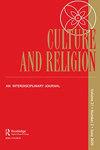Sublime Sahib: white masculine identity formation in big mountain climbing
IF 0.5
0 RELIGION
引用次数: 0
Abstract
ABSTRACT This article explores western big mountain climbing practices in the Himalaya as ‘secular’ processes of identity formation with historical roots in Victorian efforts at sublimation. Such practices necessitate a series of social, embodied, and psychical distinctions structuring (and structured by) a white, western masculine identity. Looking to news and video documentary narratives by and about the late Swiss mountaineer Ueli Steck, this article works to situate big mountain climbing discourses as relevant to the academic study of religion through the notion of the sublime and its relationship to secularisation (broadly construed). It also situates big mountain climbing discourses in terms of contemporary postcolonial and critical whiteness scholarship on social identity. The notion of the subliminal is both the descriptive goal of many climbing pursuits, and also the means of denying the white masculine identity forged through such processes. Making use of critical social theoretic lenses as offered by both Pierre Bourdieu and Jean-François Bayart, big mountain climbing is shown as a space of white masculine identity formation supported by various appeals to ‘sacred/profane’ distinctions – both embodied and discursive. Through these distinctions, in big mountain climbing, colonial contact’s impact on structural realities makes possible a salient white masculine identity that is forged and disavowed through twin confrontations with the land and the indigenous peoples inhabiting it.崇高的萨希布:大型登山运动中白人男性身份的形成
摘要本文探讨了西方在喜马拉雅的大型登山活动,将其视为身份形成的“世俗”过程,其历史根源在于维多利亚时代的升华。这种做法需要一系列社会、具体化和心理上的区别,以构建(和构建)白人、西方男性身份。本文着眼于已故瑞士登山家乌埃里·斯塔克的新闻和视频纪录片叙事,通过崇高的概念及其与世俗化的关系(广义解释),将大型登山话语定位为与宗教学术研究相关的话语。它还将大型登山话语置于当代后殖民和批判白人社会身份的学术视野中。潜意识的概念既是许多攀登追求的描述性目标,也是否认通过这些过程形成的白人男性身份的手段。利用Pierre Bourdieu和Jean-François Bayart提出的批判性社会理论视角,大型登山被展示为一个白人男性身份形成的空间,由对“神圣/亵渎”区别的各种诉求支持——既有具体的,也有散漫的。通过这些区别,在大型登山活动中,殖民地接触对结构现实的影响使一种突出的白人男性身份成为可能,这种身份是通过与土地和居住在土地上的土著人民的双重对抗而形成和否认的。
本文章由计算机程序翻译,如有差异,请以英文原文为准。
求助全文
约1分钟内获得全文
求助全文

 求助内容:
求助内容: 应助结果提醒方式:
应助结果提醒方式:


